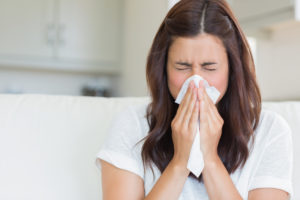NASAL POLYPS (NASAL POLYPOSIS)
NASAL POLYPS (NASAL POLYPOSIS)

Nasal polyps are grape-like growths that occur in the nasal cavity and sinuses. They are caused by chronic inflammation and are often found in allergic patients, as allergies cause chronic inflammation. The inflammation of the mucous membranes of the sinuses and nose cause the development of nasal polyps. About 4 – 5% of the population has nasal polyps. Nasal polyps are very rarely cancerous, however, one-sided polyps, especially ones that are associated with bleeding and/or pain, as well as one-sided tumors should be further evaluated for possible cancer.
Many individuals have nasal polyps and are unaware that they have them. Sometimes, the polyps are small and do not cause symptoms. However, when they get too large, they can and frequently do block the nasal cavity and cause symptoms such as nasal congestion. Other symptoms that can occur include runny nose, decreased sense of taste and smell, sinus pressure and headaches. By blocking the nasal cavity, nasal polyps block the normal drainage from the sinuses. This frequently causes a sinus infection (sinusitis) to form in the patient. This is manifested by the patient’s mucous to become thick and discolored (usually yellow to green in color). In addition, the drainage goes down the back of the throat giving rise to a post-nasal drip which people find very annoying. The post nasal-drip often causes the patient to acquire a sore or irritated throat and/or hoarseness. Antibiotics are frequently needed to treat the patient’s sinus infection.
The diagnosis of nasal polyps requires a physician to examine your nose and look for these grape-like growths. They can be confused with swollen turbinates, if the doctor is unfamiliar with the nasal anatomy. Turbinates are a normal part of the structure of the inside of the nose. They will get pale and swollen in allergic patients when they come in contact with allergens. In addition to allergic rhinitis (hay fever), nasal polyps can be found in association with many other diseases such as non-allergic rhinitis, asthma, chronic sinusitis (chronic sinus infection), aspirin sensitivity, and immunodeficiency diseases such as Cystic Fibrosis, Churg-Strauss Disease, Common Variable Immunodeficiency, Primary Ciliary Dyskinesia, and Selective IgA Deficiency (the most common primary immunodeficiency which affects about 1 in 300 to 700 individuals in the U.S.). There is also a condition known as Samter’s Triad or Aspirin-Exacerbated Respiratory Disease (AERD) which consists of nasal polyps, asthma, and aspirin/non-steroidal anti-inflammatory drugs (NSAID) sensitivity. Common NSAID’s are Ibuprofen (Motrin; Advil), Naproxen (Aleve; Naprosyn), Piroxican (Feldene), Meloxicam (Mobic), Indomethacin (Indocin), Celecoxib (Celebrex), and Diclofenac (Voltaren). In this condition, aspirin and/or NSAID’s can exacerbate the patient’s asthma and/or allergic rhinitis symptoms. These patients must avoid aspirin and NSAID’s.
The best way to treat nasal polyps is to reduce the cause of the inflammation. This can be accomplished with allergy shots (allergy immunotherapy). The use of topical corticosteroids and/or oral corticosteroids is usually necessary to reduce the inflammation already present when the patient is first seen. The topical corticosteroids may be necessary long-term to prevent the inflammation and thus the nasal polyps from returning. Surgical removal of the nasal polyps may also be necessary in some individuals, however, it is not uncommon for the nasal polyps to also return after surgery. It is therefore necessary to prevent the inflammation which is the root cause of the nasal polyps. Allergy shots are very effective in preventing this primary inflammation.
The board certified allergists at Black & Kletz Allergy have been diagnosing and treating nasal polyps in adults and children in the Washington, DC, Maryland, and Virginia (DMV) metropolitan area for several decades. We have been able to successfully alleviate unwanted nasal congestion and sinus infections in our patients. If you would like to be evaluated and treated for nasal congestion, decreased sense of taste and smell, sinus congestion, sinus infections (sinusitis), sinus headaches, post-nasal drip, and/or nasal polyps, please call us today so that we may help you.












